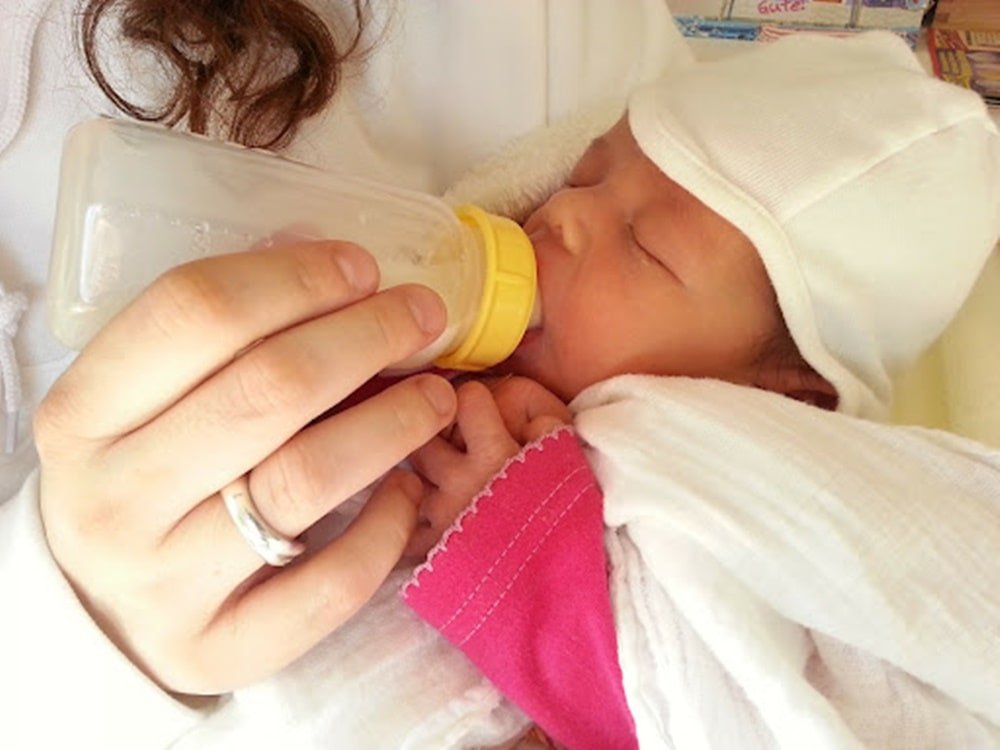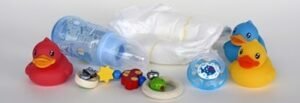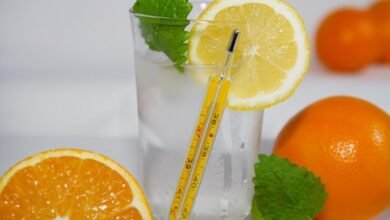
Many mothers are hesitant to use baby formula, especially in light of the current trend emphasizing the value of breastfeeding.
Every mother has a different situation, however.
Here’s -dearest mum- all you need to know about feeding your baby that can help you make the right decision to either breastfeed or use baby formula.
Components of baby formula
Baby formula mimics breast milk, as it contains six essential elements.
They are protein, fats, carbohydrates, vitamins, minerals, and other nutrients, such as probiotics.
The companies producing formulas compete with each other and differ in the type of protein used.
Some of the formulas contain cow’s milk protein or soy protein.
Others contain partially or completely hydrolyzed protein.
However, this distinction is not for the sake of rivalry; rather, each variety serves a specific purpose.
For example, doctors prescribe milk-containing soy protein for children with allergies to milk protein.
Breast milk or baby formula?
Formula milk is a healthy alternative to breast milk.
However, the World Health Organization (WHO) and the American Academy of Pediatrics have stated that breast milk is the best choice for at least the first year of life.
But many mothers do not have the luxury of choice and were actually forced by life circumstances to give up breastfeeding.
Let’s compare the two options in several aspects, in this way you can see how you can make the right choice.
Disease prevention
Breast milk is characterized by its ability to protect the child from many diseases; due to the passage of antibodies from breast milk to the baby, consequently enhancing the baby’s immunity.
Allergies
Breast milk protects the child from allergies, as well as from asthma.
Breast milk also protects the child from the risk of diabetes, sudden death syndrome, and obesity.
Digestion
Breast milk is more easily digestible than formula, which reduces the child’s exposure to colics.
The cost
Breast milk is free, whereas formulas will cost you quite a sum of money.
Advantages of using baby formulas
We just highlighted the disadvantages of using baby formula, now here are the benefits:
- It is easy to feed the child, so it is not the role of mothers only, but it also gives the father time to form an emotional bond with his child.
- Mums can feed their babies anywhere without feeling embarrassed.
- Mums will know exactly their children’s daily milk requirements.
- There’s always enough to fulfill the child.
- The mother will not have to change her diet to cope with breastfeeding.
Reasons for using baby formulas
Sometimes we choose formula out of necessity, such as a mother’s infection with any disease that can be transmitted through the milk or during the baby’s proximity to the mother when breastfeeding.
Some mothers choose not to breastfeed their children for a variety of reasons, such as work, psychological, or personal concerns.
But this is your decision, dear mother, and the most critical decision you have to make for your child during his first months, so make the choice that best suits your circumstances.
How to prepare baby formula

Preparation requires care to sustain the child’s health, and here is the best method to go about it:
- Before you do anything, double-check the expiration date.
- Prepare the milk in a hygienic environment, using clean hands that have been cleansed with soap and water.
- Sterilize the feeding bottle and nipple well by boiling them in water for a few minutes or using a bottle sterilizer.
- Prepare a feeding bottle by adding water (previously boiled and then left to cool), then add milk powder in the proportion mentioned on the package.
- After feeding the baby, throw out what’s left in the feeding bottle. Be sure to wash it with soap and water or put it in the dishwasher.
Formula milk may spoil when left at room temperature and should be refrigerated and used within 24 hours.
If not refrigerated, use within two hours maximum.
When feeding the baby with a bottle, there may be part of the milk left, so be sure to get rid of it and don’t feed it to the baby because saliva combined with the milk used creates a suitable media for bacterial growth.
The best formulas for newborns
Choosing the best formula depends on the child’s condition and the pediatrician’s choice.
For example, your pediatrician may choose milk containing hydrolyzed protein for patients with asthma and allergies, as well as for patients with indigestion.
A range of symptoms may prompt you to change the type of milk you use but only after checking with your pediatrician.
These symptoms include (allergy, diarrhea, discomfort), and you may also have to change it when your child needs more iron.
Also, if you notice one of the following, see your pediatrician immediately (dry, red, and scaly skin, diarrhea, fatigue, and general weakness, or vomiting).
Baby formulas in the Egyptian market
- Similac infant formula milk: give stage No. 1 for children under six months and stage No. 2 for children over six months.
- Bebelac lactose-free milk: is suitable for children with lactose intolerance.
- S-26 gold.
- Hero baby nutradefense: is fortified with elements to enhance the immunity of your child.
Disadvantages of baby formula
Let us not be fooled by the benefits of formula milk and overlook its numerous drawbacks, such as:
- It takes twice as long to digest formula milk compared to breast milk, which affects the number of times the child needs to breastfeed and may cause digestive problems, such as gas and indigestion.
- The formula does not provide immunity against different diseases like breast milk. Also, it may cause infections to the baby if the water used for preparation is not sterilized or if the formula is not properly stored.
- Finally, published research indicates that a child whose family has a history of asthma may be more likely to develop asthma if he drinks a bottle while sleeping in the bed.
What if I have to use baby formula?
Mothers may suffer feelings of guilt if they cannot breastfeed and may even experience depression, so here are some of the following tips to help them cope:
- Seek help from a lactation consultant who may be able to assist you.
- Do not blame yourself -that is not your fault- the important thing is that you and your baby are healthy, and that is not the end of the world.
- Get the type of formula that best suits your child’s condition.
- Do not believe tales that an emotional tie exists between you and your baby solely while breastfeeding. You may achieve the same emotional bond by cuddling your baby and handing him the feeding bottle.
- Focus on the fact that you have a healthy, gorgeous kid, not only the fact that you haven’t been breastfeeding.
To summarise, the mother’s decision to use formula is her own, and no one has the right to judge her, especially if the situation is beyond her control.
You are not alone, since many mothers must use a baby formula for their newborns so, let go of those guilt feelings.
Read also:
First aid for children | Save your child’s life!



